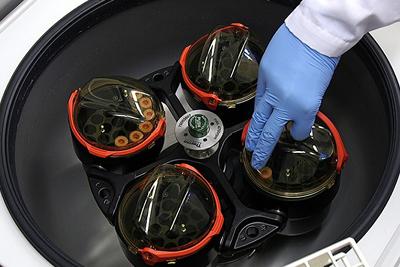Blood-based test accurately identifies viral infection before symptoms develop

The study, conducted prior to COVID-19, has broad potential for pandemic responses
A team of Duke Health scientists have identified biomarkers that accurately identify numerous viral infections across the clinical stages of disease, advancing a potential new way to guide treatment, quarantine decisions, and other clinical and public health interventions in the setting of endemic and pandemic infectious diseases.
The blood-based test uses a gene expression assay to correctly predict nine different respiratory viral infections -- including influenza, enterovirus, adenovirus and coronaviruses known to cause common colds. It shows the body’s genes responding to a pathogen before symptoms are present.
“While our study was conducted prior to the COVID-19 pandemic, our data show that these biomarkers of viral infection are present and detectable before clinical disease develops and thus could form the basis of novel approaches to early identification and management of emerging viral outbreaks and pandemics,” said Micah McClain, M.D., Ph.D., associate professor in the Department of Medicine at Duke and lead author of a study publishing online Sept. 24 in The Lancet Infectious Diseases.
 Micah McClain, M.D., Ph.D.
Micah McClain, M.D., Ph.D.McClain said additional studies are ongoing to determine the genomic markers’ effectiveness in detecting SARS-CoV-2, the strain of coronavirus that causes COVID-19. Preliminary findings from those studies have been posted on a public website and the data are currently under peer review.
McClain and colleagues in the Duke Center for Applied Genomics and Precision Medicine have been working for years to develop and fine-tune tests that quickly distinguish bacterial infections from viral infections – a public health need to assure that antibiotics are properly prescribed. Antibiotics are ineffective against viruses, and their improper use has fueled the rise of treatment-resistant bacteria.
The current study advances that work and provides a clinically applicable approach to not only identify a viral infection, but to do so before symptoms develop and often before standard viral PCR tests become positive.
The researchers enrolled 1,465 college students at Duke between 2009 and 2015 and monitored them for the entire academic year for the presence and severity of eight symptoms of respiratory tract infections. Participants filled out a daily web-based survey, rating symptoms on a scale of 0–4.
Index cases were defined as study participants who reported a 6-point increase in a cumulative daily symptom score. Bio-specimens were collected from 264 index cases with clinical illness, of whom 150 had a respiratory viral cause confirmed by traditional PCR testing of nasopharyngeal samples.
Close contacts of the sick study participants – roommates, close friends and partners considered to be at increased risk of developing symptoms -- were monitored for five days for symptoms and viral shedding. The researchers also measured gene expression responses using the blood-based 36-gene RT-PCR assay.
Of the 555 close contacts enrolled and sampled, 162 developed symptoms of respiratory tract infection during observation, of whom 106 had confirmed illness based on traditional viral PCR testing.
For most of the study participants, the gene expression test accurately predicted viral infection up to three days before maximum symptoms, often prior to any symptom onset or detectable viral shedding.
For influenza, the assay was 99% accurate in predicting illness, 95% accurate for adenovirus and 93% accurate for the cold-causing coronavirus strain.
“Our study demonstrates the potential of this gene expression-based testing approach,” McClain said. “We can use the body’s natural immune response signals to detect a viral infection with a high degree of accuracy even at a time when people have been exposed to the pathogen but don’t yet feel sick.”
In addition to McClain, study authors include Florica J. Constantine, Bradly P. Nicholson, Marshall Nichols, Thomas W. Burke, Ricardo Henao, Daphne C Jones, Lori L. Hudson, L. Brett Jaggers, Timothy Veldman, Anna Mazur, Lawrence P. Park, Sunil Suchindran, Ephraim L. Tsalik, Geoffrey S. Ginsburg, Christopher W. Woods.
The study received funding support from the U.S. Defense Advanced Research Projects Agency.
Study authors Burke, Tsalik, Ginsburg and Woods have financial relationships with Predigen, an emerging company in precision medicine that is a spin-out from Duke University. Predigen was founded to advance the technology to clinical use.
This article was first published in Duke Health News